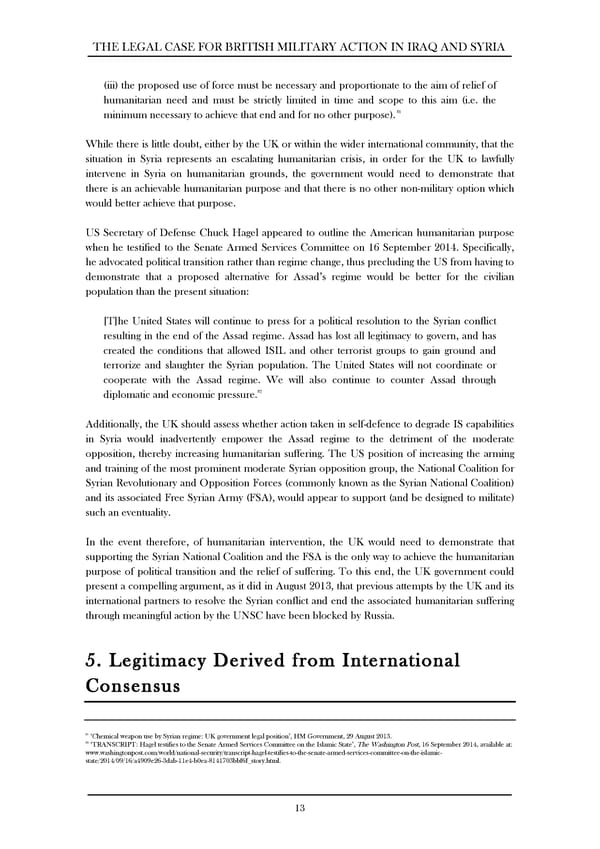THE LEGAL CASE FOR BRITISH MILITARY ACTION IN IRAQ AND SYRIA (iii) the proposed use of force must be necessary and proportionate to the aim of relief of humanitarian need and must be strictly limited in time and scope to this aim (i.e. the 81 minimum necessary to achieve that end and for no other purpose). While there is little doubt, either by the UK or within the wider international community, that the situation in Syria represents an escalating humanitarian crisis, in order for the UK to lawfully intervene in Syria on humanitarian grounds, the government would need to demonstrate that there is an achievable humanitarian purpose and that there is no other non-military option which would better achieve that purpose. US Secretary of Defense Chuck Hagel appeared to outline the American humanitarian purpose when he testified to the Senate Armed Services Committee on 16 September 2014. Specifically, he advocated political transition rather than regime change, thus precluding the US from having to demonstrate that a proposed alternative for Assad’s regime would be better for the civilian population than the present situation: [T]he United States will continue to press for a political resolution to the Syrian conflict resulting in the end of the Assad regime. Assad has lost all legitimacy to govern, and has created the conditions that allowed ISIL and other terrorist groups to gain ground and terrorize and slaughter the Syrian population. The United States will not coordinate or cooperate with the Assad regime. We will also continue to counter Assad through 82 diplomatic and economic pressure. Additionally, the UK should assess whether action taken in self-defence to degrade IS capabilities in Syria would inadvertently empower the Assad regime to the detriment of the moderate opposition, thereby increasing humanitarian suffering. The US position of increasing the arming and training of the most prominent moderate Syrian opposition group, the National Coalition for Syrian Revolutionary and Opposition Forces (commonly known as the Syrian National Coalition) and its associated Free Syrian Army (FSA), would appear to support (and be designed to militate) such an eventuality. In the event therefore, of humanitarian intervention, the UK would need to demonstrate that supporting the Syrian National Coalition and the FSA is the only way to achieve the humanitarian purpose of political transition and the relief of suffering. To this end, the UK government could present a compelling argument, as it did in August 2013, that previous attempts by the UK and its international partners to resolve the Syrian conflict and end the associated humanitarian suffering through meaningful action by the UNSC have been blocked by Russia. 5. Legitimacy Derived from International Consensus 81 ‘Chemical weapon use by Syrian regime: UK government legal position’, HM Government, 29 August 2013. 82 ‘TRANSCRIPT: Hagel testifies to the Senate Armed Services Committee on the Islamic State’, The Washington Post, 16 September 2014, available at: www.washingtonpost.com/world/national-security/transcript-hagel-testifies-to-the-senate-armed-services-committee-on-the-islamic- state/2014/09/16/a4909e26-3dab-11e4-b0ea-8141703bbf6f_story.html. 13
 The legal case for action Page 12 Page 14
The legal case for action Page 12 Page 14